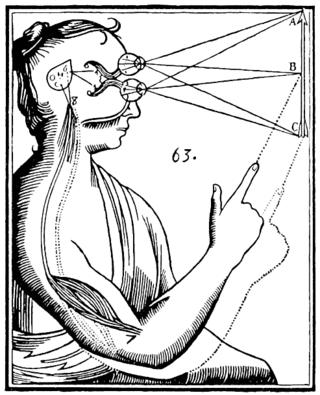
Metaphysics is the branch of philosophy that examines the basic structure of reality. It is traditionally seen as the study of mind-independent features of the world, but some theorists view it as an inquiry into the conceptual framework of human understanding. Some philosophers, including Aristotle, designate metaphysics as first philosophy to suggest that it is more fundamental than other forms of philosophical inquiry.
Ontology is the philosophical study of being. It is traditionally understood as the subdiscipline of metaphysics focused on the most general features of reality. As one of the most fundamental concepts, being encompasses all of reality and every entity within it. To articulate the basic structure of being, ontology examines the commonalities among all things and investigates their classification into basic types, such as the categories of particulars and universals. Particulars are unique, non-repeatable entities, such as the person Socrates, whereas universals are general, repeatable entities, like the color green. Another distinction exists between concrete objects existing in space and time, such as a tree, and abstract objects existing outside space and time, like the number 7. Systems of categories aim to provide a comprehensive inventory of reality by employing categories such as substance, property, relation, state of affairs, and event.
Substance theory, or substance–attribute theory, is an ontological theory positing that objects are constituted each by a substance and properties borne by the substance but distinct from it. In this role, a substance can be referred to as a substratum or a thing-in-itself. Substances are particulars that are ontologically independent: they are able to exist all by themselves. Another defining feature often attributed to substances is their ability to undergo changes. Changes involve something existing before, during and after the change. They can be described in terms of a persisting substance gaining or losing properties. Attributes or properties, on the other hand, are entities that can be exemplified by substances. Properties characterize their bearers; they express what their bearer is like.

In their most common sense, the terms thought and thinking refer to cognitive processes that can happen independently of sensory stimulation. Their most paradigmatic forms are judging, reasoning, concept formation, problem solving, and deliberation. But other mental processes, like considering an idea, memory, or imagination, are also often included. These processes can happen internally independent of the sensory organs, unlike perception. But when understood in the widest sense, any mental event may be understood as a form of thinking, including perception and unconscious mental processes. In a slightly different sense, the term thought refers not to the mental processes themselves but to mental states or systems of ideas brought about by these processes.

Reductionism is any of several related philosophical ideas regarding the associations between phenomena which can be described in terms of simpler or more fundamental phenomena. It is also described as an intellectual and philosophical position that interprets a complex system as the sum of its parts.
In environmental philosophy, environmental ethics is an established field of practical philosophy "which reconstructs the essential types of argumentation that can be made for protecting natural entities and the sustainable use of natural resources." The main competing paradigms are anthropocentrism, physiocentrism, and theocentrism. Environmental ethics exerts influence on a large range of disciplines including environmental law, environmental sociology, ecotheology, ecological economics, ecology and environmental geography.

In the philosophy of mind, mind–body dualism denotes either that mental phenomena are non-physical, or that the mind and body are distinct and separable. Thus, it encompasses a set of views about the relationship between mind and matter, as well as between subject and object, and is contrasted with other positions, such as physicalism and enactivism, in the mind–body problem.
A land ethic is a philosophy or theoretical framework about how, ethically, humans should regard the land. The term was coined by Aldo Leopold (1887–1948) in his A Sand County Almanac (1949), a classic text of the environmental movement. There he argues that there is a critical need for a "new ethic", an "ethic dealing with human's relation to land and to the animals and plants which grow upon it".
A person is a being who has certain capacities or attributes such as reason, morality, consciousness or self-consciousness, and being a part of a culturally established form of social relations such as kinship, ownership of property, or legal responsibility. The defining features of personhood and, consequently, what makes a person count as a person, differ widely among cultures and contexts.
The existence of God is a subject of debate in the philosophy of religion and theology. A wide variety of arguments for and against the existence of God can be categorized as logical, empirical, metaphysical, subjective, or scientific. In philosophical terms, the question of the existence of God involves the disciplines of epistemology and ontology and the theory of value.
Peter van Inwagen is an American analytic philosopher and the John Cardinal O'Hara Professor of Philosophy at the University of Notre Dame. He is also a research professor of philosophy at Duke University each spring. He previously taught at Syracuse University, earning his PhD from the University of Rochester in 1969 under the direction of Richard Taylor. Van Inwagen is one of the leading figures in contemporary metaphysics, philosophy of religion, and philosophy of action. He was the president of the Society of Christian Philosophers from 2010 to 2013.
The philosophy of mind is a branch of philosophy that deals with the nature of the mind and its relation to the body and the external world.
In philosophy, mereological essentialism is a mereological thesis about the relationship between wholes, their parts, and the conditions of their persistence. According to mereological essentialism, objects have their parts necessarily. If an object were to lose or gain a part, it would no longer be the original object.
Metaontology or meta-ontology is the study of the field of inquiry known as ontology. The goal of meta-ontology is to clarify what ontology is about and how to interpret the meaning of ontological claims. Different meta-ontological theories disagree on what the goal of ontology is and whether a given issue or theory lies within the scope of ontology. There is no universal agreement whether meta-ontology is a separate field of inquiry besides ontology or whether it is just one branch of ontology.

A mathematical object is an abstract concept arising in mathematics. Typically, a mathematical object can be a value that can be assigned to a symbol, and therefore can be involved in formulas. Commonly encountered mathematical objects include numbers, expressions, shapes, functions, and sets. Mathematical objects can be very complex; for example, theorems, proofs, and even formal theories are considered as mathematical objects in proof theory.
Eric Todd Olson is an American philosopher who specializes in metaphysics and philosophy of mind. Olson is best known for his research in the field of personal identity, and for advocating animalism, the theory that persons are animals. Olson received a BA from Reed College and a PhD from Syracuse University. Olson is currently a professor of philosophy at the University of Sheffield.
In the philosophy of religion, an ontological argument is a deductive philosophical argument, made from an ontological basis, that is advanced in support of the existence of God. Such arguments tend to refer to the state of being or existing. More specifically, ontological arguments are commonly conceived a priori in regard to the organization of the universe, whereby, if such organizational structure is true, God must exist.
Open individualism is a view in the philosophy of self, according to which there exists only one numerically identical subject, who is everyone at all times, in the past, present and future. It is a theoretical solution to the question of personal identity, being contrasted with "Empty individualism", the view that personal identities correspond to a fixed pattern that instantaneously disappears with the passage of time, and "Closed individualism", the common view that personal identities are particular to subjects and yet survive over time.
Personal identity is the unique numerical identity of a person over time. Discussions regarding personal identity typically aim to determine the necessary and sufficient conditions under which a person at one time and a person at another time can be said to be the same person, persisting through time.
The term quantifier variance refers to claims that there is no uniquely best ontological language with which to describe the world. The term "quantifier variance" rests upon the philosophical term 'quantifier', more precisely existential quantifier. A 'quantifier' is an expression like "there exists at least one 'such-and-such'". Quantifier variance then is the thesis that the meaning of quantifiers is ambiguous. This thesis can be used to explain how some disputes in ontology are only due to a failure of the disagreeing parties to agree on the meaning of the quantifiers used.




